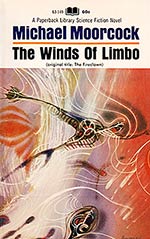
![]() Naomi_uk72
Naomi_uk72
5/23/2021
![]()
The Winds of Limbo (originally published as The Fireclown) is less of a sci-fi adventure romp than The Sundered Worlds, and more of a socio-political thriller. Inspired (and by Moorcock's own admission quite heavily so) by Benjamin Disraeli's novel Coningsby, the main narrative follows protagonist Alan Powys has he investigates the mysterious Fireclown and tries to understand why his grandfather, political heavy-hitter Simon Powys, seems so determined to eradicate the Fireclown from existence.
Along the way there are various arguments discussing the pros and cons of the two primary political viewpoints, represented by conservatism in the form of the Solar Referendum party and liberalism in the shape of the Radical Liberal Movement, and it's not all that difficult to see connections here with Moorcock's wider views on the conflict between Law/Order and Chaos/Entropy as explored in his many other works. Indeed, it could almost be argued that conservatism plays the role of Law, being "...unable to see a change as progress...", with liberalism being akin to Chaos in its desire to "...progress in many directions, not just one!"
There are some aspects of this book that haven't aged well. The repeated use of the word negro when referring to a character of Zimbabwean origin feels especially uncomfortable fifty-five years down the line, even if it is a technically correct term. At least the word is no longer capitalised, as it was in the original 1965 edition. That said, even despite this and other less egregious anachronisms, the core of the narrative still holds up quite well.
In terms of its connection to the greater whole of Moorcock's multiversal tales, it doesn't really have all that much in common with them. The Fireclown does make a couple of offhand references to the multiverse, and in a couple of later works Moorcock does identify Alan Powys as an incarnation of the eternal champion, but apart from that it still feels more like a standalone work than a part of something much bigger.
Definitely not as complex as The Sundered Worlds, but still a reasonably enjoyable read.